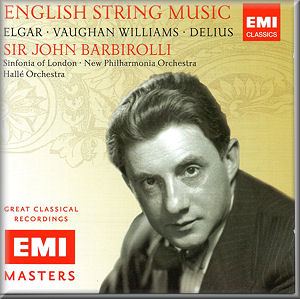 |
 |
|


alternatively
CD: MDT
AmazonUK
AmazonUS
|
English String Music
Edward ELGAR (1857 – 1934)
Introduction and Allegro, op.47 (1905) [14:06]
Serenade in E minor,
op.20 [13:12]
Elegy, op.58 (1909) [4:30]
Sospiri, op.70 (1914) [5:17]
Ralph VAUGHAN WILLIAMS
(1872 – 1958)
Fantasia on a Theme by Thomas Tallis (1910) [16:20]
Fantasia on Greensleeves (1929) [4:39]
Frederick DELIUS (1862 – 1934)
Brigg Fair:An English Rhapsody (1908) [18:17]
 Allegri
Quartet (Eli Goren and James Barton (violins), Patrick Ireland (viola),
William Pleeth (cello)), Sinfonia of London, New Philharmonia Orchestra
(Elegy and Sospiri only) Hallé Orchestra (Delius only)/Sir John Barbirolli Allegri
Quartet (Eli Goren and James Barton (violins), Patrick Ireland (viola),
William Pleeth (cello)), Sinfonia of London, New Philharmonia Orchestra
(Elegy and Sospiri only) Hallé Orchestra (Delius only)/Sir John Barbirolli
rec. 10-11 May 1962 (Introduction and Allegro, Serenade and Greensleeves),
16 July 1966 (Elegy and Sospiri), 15-17 July 1970 (Delius), Kingsway
Hall, London and 17 May 1962 (Tallis Fantasia), Temple Church, London.
ADD
Re–issues of LPs: ASD 521 and parts of ASD 2292 and ASD 2635
CD first issued in the GROC series
 EMI CLASSICS MASTERS 6 31788 2 [76:27]
EMI CLASSICS MASTERS 6 31788 2 [76:27] 
|
|
|
English String Music is the name of one of Glorious John’s
very best LPs, and it has long been seen as a touchstone of
great string playing, and of great English string music. This
is Barbirolli at the peak of his career, directing music he
loves. Indeed, it is one of the great records; a miraculous
achievement of the right personnel, the right conductor and
the right repertoire. Rarely comest thou, Spirit of Delight!,
Elgar wrote at the head of his 2nd
Symphony, and the same could be said of this recording.
These performances defy criticism, so I am not going to criticise
merely introduce them to those unfortunate not to have heard
them.
The Introduction and Allegro and Tallis Fantasia
both have the addition of the original Allegri Quartet – shame
on EMI for not making mention of their participation in large
print on the cover of the booklet – and how well the four players
complement the massed strings, and join in the fabulous music-making.
JB made the first two recordings of the Introduction and
Allegro – Elgar never recorded it but knew Barbirolli’s
recordings, saying that he had never realised what a big piece
it was! Barbirolli’s second (1929) recording of the work can
be found on Barbirolli Society (CDSJB 1999 – a 2 CD set of varied
material). In JB’s hands it is a big piece – I have never
heard it sound so full and resplendent – and he pulls out all
the stops for this performance, giving a powerhouse of a performance.
On top of that there is the marvellous moment, at 9:46 where
the great William Pleeth leads the music into the recapitulation
– sensational!
The Serenade receives a bit of a hothouse performance
but it can stand this con amore approach for JB is utterly
sincere in his direction. He even proves that the slow movement
is, quite obviously, the forerunner of the great slow movements
in the Symphonies.
The Tallis Fantasia gains from being recorded in the
Temple Church and that acoustic lets the music breathe and expand
to fill the space. It also allows for the distant orchestra
to be heard clearly in relation to the full body of strings.
And just listen to JB’s magnificent use of rubato at
10:48. Superb!
The Greensleeves Fantasia brought that LP to a delectable
conclusion, and it is a lovely sweetmeat, before Delius’s visit
to the countryside. Thus ends English String Music, the
LP. The only thing which could have made it perfect would have
been a reprint of Burnett James’s original sleeve-notes!
The Elegy – Elgar’s epitaph for his friend A.E. Jaeger,
Nimrod of the Enigma – and Sospiri come from an
LP of Elgar’s music, which included the five Pomp and Circumstance
Marches – what a suite of music that is! They are both deeply-felt
works and JB brings out all the longing and pathos of the music
in beautifully understated performances.
This recording of Brigg Fair comes from JB’s last recording
session and what a performance it is! JB’s Delius is more romantic,
more languid, than Beecham’s, but it is equally valid. This
performance makes Brigg Fair into the symphonic movement
it so obvious is – it’s more coherent, with regard to form,
than much of Delius, but it’s seldom seen that way. JB characterises
each variation well and the funeral march is especially impressive.
These transfers are exemplary. The notes, by the wonderful Michael
Kennedy are excellent. If this disk isn’t in your collection
it should be. There is no excuse for its omission. This is perfection.
It’s true. They really don’t make them like this any more.
Bob Briggs
see also review of a different reissue by Harry
Downey
|
|
|

